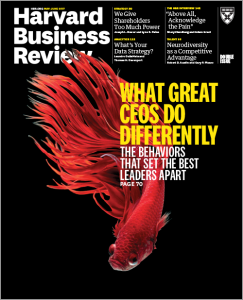To be perfectly honest, the past decade I have now and again felt like Don Quixote. You remember, he from the novel The Ingenious Nobleman Mister Quixote of La Mancha, written by the Spanish novelist Miguel de Cervantes Saavedra in 1605 (part 1) and 1615 (part 2). The novel recounts the adventures of an elderly nobleman who thinks delusionally that he is a knight who has to set out to rescue damsels in distress and right the wrongdoings in the world. Don Quixote, through the centuries, has become the stereotypical idealist, a person who with good intentions is not taken that seriously by his environment and thus has no authority and is not very effective.
Okay, my situation might not be that tragic but I have felt many times that the HPO thinking was flowing into the face of fashion this past decades, as society and especially the business world became increasingly orientated at bettering short-term profits and the gains of shareholders. Particularly the HPO factor Long-Term Orientation was at odds with the trend of companies trying to increase quarterly earnings and politicians trying to score and get votes with quick and not very nuanced pronunciations and plans. After all, building good long-term relations with all stakeholders clearly means that stakeholders (i.e. clients, suppliers, employees, shareholders, government, and society at large) should be at the center of what a company is about. And yes, in general in Europe this shareholder obsession seemed less bad than in the USA but the Anglo-Saxon way of doing business was also gaining ground here rapidly, even when we started to suffer from its excesses during the financial and the following economic crises.
So I was extremely glad to read the article The Error at the Heart of Corporate Leadership of Bower and Paine in a recent Harvard Business  Review (which by the way itself could be considered to be the de facto “spokesperson” and ‘representative” of Anglo-Saxon management). In this article the two professors argue for a reorientation from ‘maximizing shareholder value’ to ‘maximizing a company’s health’ and thus bettering the interests of a company’s stakeholders. They explain that the theory on which most organizations are still founded, the agency theory, has many drawbacks and could be considered to be plainly wrong. The theory states that shareholders own the corporation and therefore have the ultimate authority over its business and may legitimately demand that its activities be conducted in accordance with their wishes. Bower and Paine list in their article a whole list of disadvantages of this thinking, of which for me the most speaking are:
Review (which by the way itself could be considered to be the de facto “spokesperson” and ‘representative” of Anglo-Saxon management). In this article the two professors argue for a reorientation from ‘maximizing shareholder value’ to ‘maximizing a company’s health’ and thus bettering the interests of a company’s stakeholders. They explain that the theory on which most organizations are still founded, the agency theory, has many drawbacks and could be considered to be plainly wrong. The theory states that shareholders own the corporation and therefore have the ultimate authority over its business and may legitimately demand that its activities be conducted in accordance with their wishes. Bower and Paine list in their article a whole list of disadvantages of this thinking, of which for me the most speaking are:
- The theory does not align with daily practice: shareholders nowadays are not in the traditional sense owners of the company and thus they do not have the traditional owners’ incentives to exercise care in managing it. Many shareholders basically are at arm’s length of the company as they do not invest in the corporation itself but in mutual funds or institutional investors or have stakes in pension funds. These in turn invest in the actual company and have the goal to maximize the return on the shares they acquired. In practice these shares are traded and change hands quickly and often, meaning that the shareholders are not at all loyal to the companies they invest in and often do not even really know or care about these companies. Telling is that in the US the average holding period of public shares has gone down from 5.1 years in 1976 to 7.3 months in 2015!
- Shareholders are not accountable as owners for the company’s activities nor do they have the responsibilities that directors and managers have to protect the interests of the company. In fact, shareholders mostly feel accountable to further the interests of only one party: themselves. This causes all kind of moral problems, such as shareholders forcing decisions on a company which are good for the share price but not good for the long-term future of the company. Think for example about the recent upheaval in the Netherlands surrounding the hostile takeover bids, attempts to remove board of directors and pushing forced sakes of organizational parts at Unilever and Akzo by venture capitalists. Of course, in quite a few organizations management is not up to par or processes and ICT is not in order, and these organizations indeed need a good poking but they should get the chance to better themselves without the threat
of immediate destruction. - Activist investors often mask their interference with companies as attempts to create value (for the shareholders, of course). However, in reality it is more often than not a case of value transfer which turns out to have negative consequences for the long-term survival of the company. After all, paying out huge dividends to shareholders results in the company not being able to invest in R&D, launch new businesses, or foster growth of existing business. Value has not been created, in fact nothing has been created. Or even worse, one could argue that actually something has been destroyed: the future of the company.
Bower and Paine plead for a more company-centered model, which at its core has the promotion of an enterprise’s health, to be established throughout the business world. This model should have the following characteristics:
- The organization has excellent leaders and managers who are free to focus their attention on the proper running of the company so it has a long-term future; they should not be enticed to go for short-term gains by all kind of detrimental incentive plans.
- The organization emphatically gets the chance to learn, adapt and regularly transform itself, if the circumstances so demand.
- The organizations is allowed to perform its functions in society, which go beyond creating shareholder value and include paying taxes, deliver much needed goods and services, provide employment, and develop new technologies, among other things. Especially providing employment speaks to me because employment is the basis for happiness of people, as much recent research shows.
- The organization creates value for multiple constituencies, not only stakeholders.
- The organization has ethical standards to guide interactions with all their constituencies, including shareholders and society at large.
- The organization is very aware that it is embedded in a political and socioeconomic system whose health is vital for its own sustainability.
- And, most importantly, the interests of the organization are distinct from those of any particular shareholder or constituency group.
These characteristics are all about the sustained performance and existence of the organization. After all, if the organization has an important positive role to play in society, it only makes sense to exist as long as possible so it can add value to its constituencies as long as possible. Which in turn aligns completely with the goal and nature of the high performance organization. It comes as no surprise, then, that I  applaud the ideas of Bower and Paine and hope that the business world takes good notice of these. If not, I fear that the creation of the sorely needed high performance organizations will become an almost hopeless task. And such a grim world, ruled by investors greed and not by high performance, I do not wish to leave to our children!
applaud the ideas of Bower and Paine and hope that the business world takes good notice of these. If not, I fear that the creation of the sorely needed high performance organizations will become an almost hopeless task. And such a grim world, ruled by investors greed and not by high performance, I do not wish to leave to our children!
More information in English:
Joseph L. Bower and Lynn S. Paine (2017), The Error at the Heart of Corporate Leadership, Harvard Business Review, May – June, pp. 50-60
More information in Dutch:
Joseph Bower and Lynn Paine (2017), De Essentiële Fout van het Topmanagement, Holland Management Review, juli – augustus, pp. 51-64


